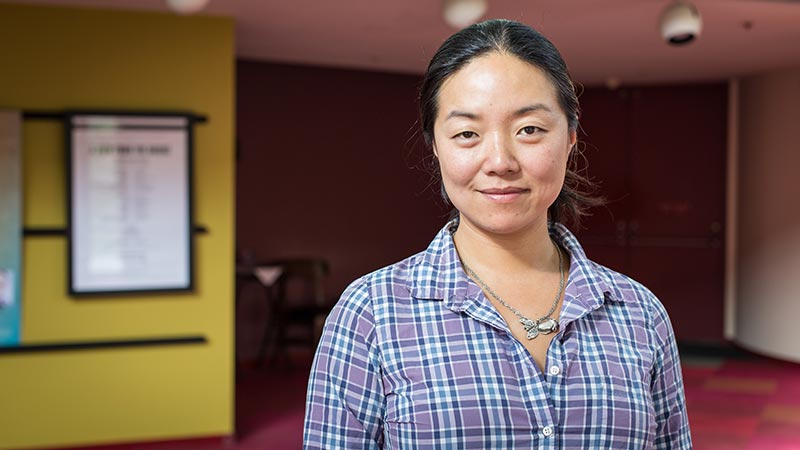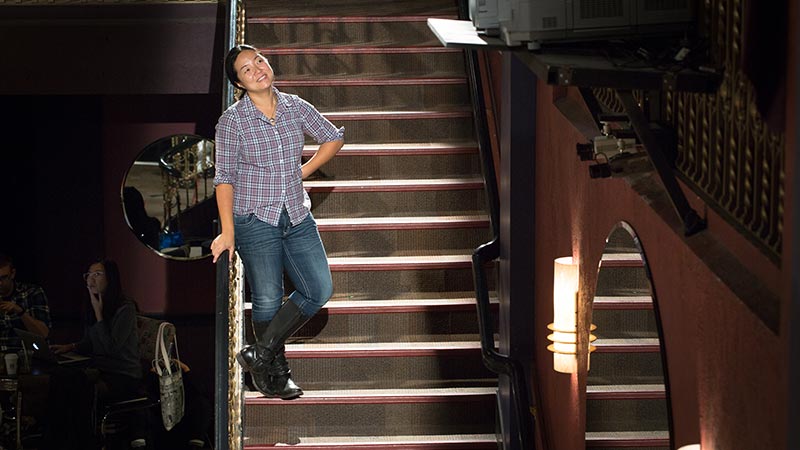“A good friend of mine and I like to say—kind of jokingly, but kind of not—that there is a lost generation of Asian American artists between the ages of 30 and 45, because of social patterns, immigration patterns, because of a clash between old-world values and new-world values,” says Desdemona Chiang.
Although today she is a sought-after stage director—as well as a recipient of the Creative Promise Prize in Theatre—Desdemona knows that she could very well have been amongst this lost generation. She immigrated to Southern California from Taiwan at the age of 3, and, with the encouragement of her parents, grew up thinking she would be a doctor.
All was going to plan until her first semester at University of California, Berkeley. To fulfill an arts requirement, Desdemona opted for Intro to Acting. “Someone told me that it’s the easiest class you’ll ever take in your entire life,” she remembers. “You just stand around in a circle and hold hands and clap all day.”
There was, indeed, hand-holding and clapping, but also something unexpected: “I rediscovered my sense of play,” she says. “I became vulnerable.” Desdemona was hooked, and she continued taking classes and participating in student theatre productions, especially relishing the opportunities it afforded for making friendships and connections.

After graduation, Desdemona decided, to the consternation of her parents, to attend the University of Washington School of Drama for a master of fine arts degree, instead of continuing her medical studies. It was not an easy decision, and looking back, she wishes she’d had a role model who understood the cultural specificity of her dilemma. “[Professors] tell you how to get a job, how to network, how to pitch a project,” she says, “but no one tells you how to face your parents at Christmas.”
Despite the initial resistance from her family, her immigrant background has brought a richness and sensitivity to her work on the stage. In 2010, Desdemona co-founded Azeotrope, a Seattle-based theatre company that investigates stories that are marginalized and underrepresented. Azeotrope’s mission also allows her to explore the intersection of activism and theatre: “To make theatre is a political act, is a social act, is an act of violence even when it’s quiet and good,” she says. “There has to be a message behind what you’re doing.”

Azeotrope’s last production, Sound, by Don Nguyen, is a case in point. Performed in both English and American Sign Language, the play explores the deeply divided opinions within the Deaf community on cochlear implants. Desdemona paired up with a deaf co-director, and the play was performed by an ensemble who were half Deaf and half with hearing, without subtitles or ASL interpreters. “I wanted to make a play so that, whether [with] hearing or Deaf, you could come in and understand it equally, but you would also be equally disadvantaged,” she says. “I wanted to create a shared experience.”
For her next project, Desdemona will be directing The Winter’s Tale at the 2016 Oregon Shakespeare Festival. She’s transported the Western classic to feudal China, however, and will be working with a predominantly Asian cast and crew (fellow Creative Promise Prizewinner Yi Zhao, in fact, will be lighting the play).
“To have a sense of ownership over the material, and to be able to direct at the Oregon Shakespeare Festival as an Asian American director is a very, very validating thing,” she says. “There’s a dearth of Asian American female directors in this country, and it means something to me that I can be a model for future young artists.”